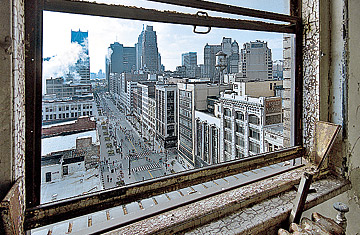
View of downtown Detroit through a window of the Broderick Tower on Woodward Avenue, 2005.
(4 of 5)
The UAW had once been the most visionary of American unions. As early as the 1940s, UAW president Walter Reuther was urging the auto companies to produce small, inexpensive cars for the average American. In 1947 and '48 the union even offered to cut wages if the Big Three would reduce the price of their cars. But by the early 1980s, the UAW had entered into a nakedly self-interested pact with the auto companies. After the union's president joined GM's chief congressional lobbyist to defeat a tougher mileage standard in 1990, the lobbyist declared that "we would not have won without the UAW." It was, he said, "one of the proudest days of my life."
The union really can't be blamed for pushing for fabulous wages and lush benefits for its members--that game required two players, and the automakers knew only how to say yes. But the union leadership's fatal mistake was insisting that workers with comparable skills and comparable seniority be paid comparable wages, irrespective of who employed them. If a machinist at a prosperous GM deserved $25 an hour, so did a machinist who worked for a barely profitable Chrysler or for a just-holding-its-own supplier plant that made axles or wheels or windshield wipers.
This defiant inattention to market reality not only placed the less healthy firms in peril, but by pricing labor so uniformly high, it also closed off Detroit to any possible diversification of its industrial base. When the automakers' inattention to engineering, style and quality caused them to crash into a wall of consumer indifference, there was no other industry that could step forward and employ workers who would have been thrilled to make even a fraction of what they once earned. Now nearly 1 in 3 Detroit residents is out of work--and not many of the unemployed have a prayer of finding a job anytime soon.
Reviving Motown
If white racism, Coleman Young and a delusional dependence on the auto industry's belief in its own virtues put Detroit where it is today, what--if anything--can pull this tragic city out of its death spiral?
You could do worse than to begin with some form of regional government. During Young's reign and for many years thereafter, the possibility of city-suburban cooperation--which is to say, black-white cooperation--was close to nil. The black city didn't want white suburbanites telling it what to do, and white suburbanites had no interest in assuming the burden of a black city.
L. Brooks Patterson, the long-serving and exceptionally able chief executive of suburban Oakland County, a prosperous community that borders Detroit to the north, represents the latter view well. "They say, 'As Detroit goes, so goes Oakland County,'" Patterson said a few weeks ago. "Not true!" He apparently believes that Eight Mile Road, the fabled thoroughfare that defines Detroit's northern border, is an impermeable membrane insulating his county from the city's ills. But Patterson knows that Oakland's prized AAA bond rating is in peril because the rating agencies are mindful of the county's proximity to Detroit to the south and Flint to the north. A downgrade could cost his constituents millions of dollars, and as the situation in Detroit deteriorates, he and his counterparts in adjacent counties will have no choice but to seek common solutions.
